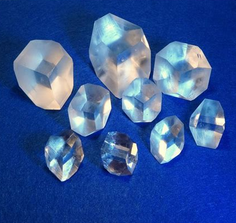Glass mycologist
Harmless

Posts: 4
Registered: 5-6-2018
Member Is Offline
|
|
Hydrazine sulfate and sodium sulfate separation
Hello,
I hope the subject hasn't been treated elsewhere but I swear I checked TFSE and got nothing.
Anyway I performed the hydrazine synthesis by rearrangement of urea and was able to make it work. I collected a first crop of hydrazine sulfate after
acidification but when I pursued acid addition I ended up precipitating sodium sulfate as well. Now that it's complete I separated the mother liquor
from the crystals.
Do you think that recrystallization from water can help me separate sodium from hydrazine sulfate? If not I'm open for suggestions but I'd rather do
it again than work with freebase hydrazine.
Can the mother liquor be boiled off to recover more product ?
|
|
|
Bedlasky
International Hazard
    
Posts: 1239
Registered: 15-4-2019
Location: Period 5, group 6
Member Is Offline
Mood: Volatile
|
|
Are you sure that sodium sulfate precipitates? After acidification more soluble sodium bisulfate is formed. So if sodium sulfate doesn't precipitate
in alkaline solution, why would sodium bisulfate precipitate in acidic solution?
|
|
|
Glass mycologist
Harmless

Posts: 4
Registered: 5-6-2018
Member Is Offline
|
|
Well i'm not sure of what really precipitated but it looked like big transparent crystals, i'm not currently at the lab so i can't provide a picture
but it looked very much like what google shows as sodium sulfate crystals (find the attached screenshot).

|
|
|
XeonTheMGPony
International Hazard
    
Posts: 1640
Registered: 5-1-2016
Member Is Offline
Mood: No Mood
|
|
This is where spending more research time would have saved you a large head ach!
Do the fist Neutralization with HCL then the final stage with H2SO4
|
|
|
UC235
National Hazard
   
Posts: 565
Registered: 28-12-2014
Member Is Offline
Mood: No Mood
|
|
As far as I know, hydrazine sulfate doesn't ever form large or transparent crystals, but if you're getting sodium sulfate decahydrate, you have not
added nearly enough sulfuric acid. What's more, dihydrazinium sulfate formed by under-acidification is extremely soluble.
|
|
|
Glass mycologist
Harmless

Posts: 4
Registered: 5-6-2018
Member Is Offline
|
|
In fact the strange thing is that I observed white crystalline solid (much tinier crystals) along with the large crystals, I assumed the white solid
was the desired hydrazine sulfate.
Should I try to continue the acid addition?
[Edited on 7-3-2021 by Glass mycologist]
|
|
|
SuperOxide
Hazard to Others
  
Posts: 486
Registered: 24-7-2019
Location: Devils Anus
Member Is Offline
|
|
Quote: Originally posted by XeonTheMGPony  | This is where spending more research time would have saved you a large head ach!
Do the fist Neutralization with HCL then the final stage with H2SO4 |
Damnit... why didn't I try this... damnit damnit.
I'm running into the same issue though, I have over 100g of the crude product, but I'm pretty sure it has some sodium sulfate in it.
 
I looked at the pubchem docs for both hydrazine sulfate and sodium sulfate, and I couldn't find a good solvent to use for this step Both are soluble in water, both are insoluble in alcohols...
If anyone has a good idea on how to separate it, just let me know. Even if there isn't a large amount of sodium sulfate contaminant in it, I would
still like to purify it.
|
|
|
macckone
Dispenser of practical lab wisdom
    
Posts: 2168
Registered: 1-3-2013
Location: Over a mile high
Member Is Offline
Mood: Electrical
|
|
sodium sulfate is much more soluble than hydrazine sulfate in 30C water, where it has it's maximum solubility.
something like 30g/100ml as opposed to 3g/100ml.
do a fractional crystallization from water, this is purification 101.
you also benefit from a common ion effect as hydrazine sulfate is less soluble in solutions containing sodium sulfate and sodium bisulfate.
sodium bisulfate is more soluble that sodium sulfate at 0C and 100C but less at 30C.
at 0C the bisulfate seems much more soluble but that is anecdotal and I haven't measured it or looked it up.
PS. if your pH was above 1.5 then you didn't get all of the hydrazine sulfate possible. And at pH of 1.0 you should have sodium bisulfate, so if you
got sodium sulfate then you didn't reduce the pH enough. Also crystalize at 25-30C not freezing.
[Edited on 28-7-2021 by macckone]
|
|
|
SuperOxide
Hazard to Others
  
Posts: 486
Registered: 24-7-2019
Location: Devils Anus
Member Is Offline
|
|
Quote: Originally posted by macckone  | sodium sulfate is much more soluble than hydrazine sulfate in 30C water, where it has it's maximum solubility.
something like 30g/100ml as opposed to 3g/100ml.
do a fractional crystallization from water, this is purification 101.
you also benefit from a common ion effect as hydrazine sulfate is less soluble in solutions containing sodium sulfate and sodium bisulfate.
sodium bisulfate is more soluble that sodium sulfate at 0C and 100C but less at 30C.
at 0C the bisulfate seems much more soluble but that is anecdotal and I haven't measured it or looked it up. |
Yeah, I was aware of the solubility between the two, I didn't do any water washings because I know I would lose some product. But I
suppose it's the only way to go.
Thanks!
Quote: Originally posted by macckone  |
PS. if your pH was above 1.5 then you didn't get all of the hydrazine sulfate possible. And at pH of 1.0 you should have sodium bisulfate, so if you
got sodium sulfate then you didn't reduce the pH enough. Also crystalize at 25-30C not freezing.
|
I did add an excess of H2SO4, but not by much. And I filtered off the solution at 15 °C. I will try to
recryst at 25 °C.
|
|
|